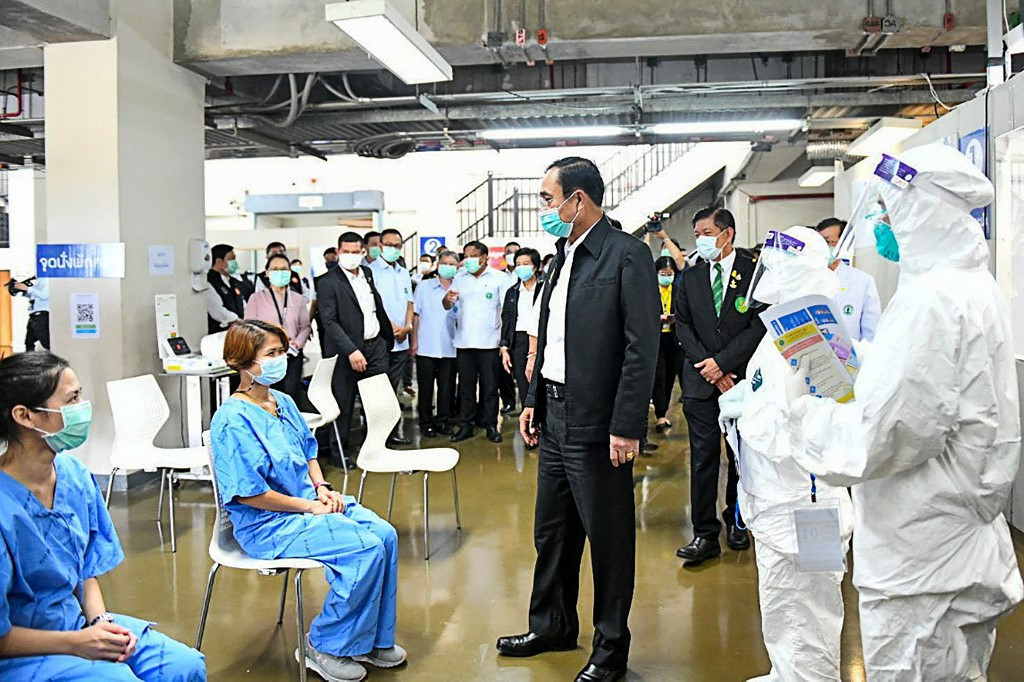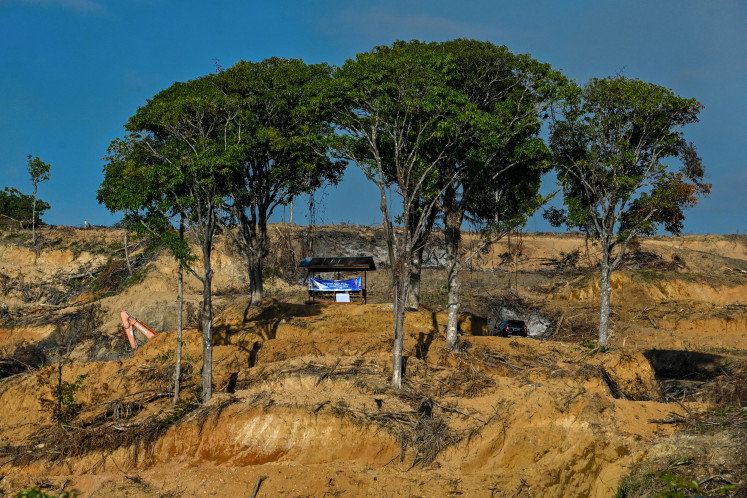Popular Reads
Top Results
Can't find what you're looking for?
View all search resultsPopular Reads
Top Results
Can't find what you're looking for?
View all search resultsSustaining healthcare in a precarious world
It is likely that the shortage of healthcare personnel will continue and deteriorate, with some exiting their profession to look for other opportunities.
Change text size
Gift Premium Articles
to Anyone
 This handout from the Bangkok Metropolitan Administration taken and released on April 21, 2021 shows Thailand's Prime Minister Prayut Chan-O-Cha (center) visiting a field hospital set up in the Bangkok Arena indoor multi-purpose sporting venue to accomodate an upsurge in the number of COVID-19 coronavirus cases in the country. (AFP/Handout)
This handout from the Bangkok Metropolitan Administration taken and released on April 21, 2021 shows Thailand's Prime Minister Prayut Chan-O-Cha (center) visiting a field hospital set up in the Bangkok Arena indoor multi-purpose sporting venue to accomodate an upsurge in the number of COVID-19 coronavirus cases in the country. (AFP/Handout)
H
ealth care is pivotal for human well-being. Yet, in today’s precarious world, it is pressured by diminishing resources, demographic variables, warfare and violence, and environmental degradation. Sustaining health care thus requires insightful planning and implementation, no less for Thailand and the ASEAN region.
The motivating factor is the global recognition that every person has the right to the highest attainable standard of health, with the state under an obligation to respect, protect and fulfill such right geared to maximum commitment of its resources. This is enhanced by a global treaty on the issue, the Covenant on Economic, Social and Cultural Rights, to which Thailand is a party.
That right does not imply that the state must guarantee that everyone is healthy, but the state is obliged to adopt a variety of measures to ensure that healthcare services are generally available to all the population, with an assurance of accessibility, affordability, acceptability and quality. This is now encapsulated by the global Sustainable Development Goals 2015-2030.
Thailand has been much lauded globally for its exemplary “universal healthcare scheme”, which provides a medical safety net for the population based on three components: The so-called “30-baht” (92 US cents) or “gold card” universal health coverage, the bureaucracy’s medical-cum-pension scheme and the social security scheme.
The first element draws from the national budget. The second is a civil service-based savings mechanism, while the third depends upon tripartite contribution from the state, employers and employees.
The 30-baht scheme covers the broadest spectrum of the population and it is now over two decades old. It has been much appreciated by the general public for facilitating access to health services at little or no cost. It is administered by the National Health Security Office with flexibility, and this helps to avoid much of the bureaucratic paperwork that would hamper service delivery. The large number of community health volunteers was also rightly commended by the United Nations special rapporteur on health who visited Thailand recently.
Yet, various storm clouds are looming. First, in just over 10 years from now, Thailand will become a super-aged society, with over 30 per cent of the population aged over 60 years old. This will be an enormous burden on the health system. Second, there is already a shortage of health personnel, particularly doctors and nurses, and this core group will also be ageing. Third, the budget might be reduced, especially when the economy splutters amid a global downtown. Fourth, there is the enigma of “how universal is universal?”
The fourth question deserves clarification. At present, the healthcare scheme can be described as “universal for Thais” rather than “universal for everyone in Thailand”. There are some non-Thais who fall between the different stools, thus being unprotected, and this is most visible among undocumented migrant workers and displaced persons along the border.
The preferred approach is voiced by the UN-backed International Convention on the Protection of the Rights of All Migrant Workers and Members of their Families which advocates access for all to (at least) urgent health care. Compromise can also be reached by enabling them to buy medical insurance irrespective of their immigration status.
Most poignantly, there are some 80,000 displaced persons from Myanmar who have been sheltered in Thailand in recent decades. The current crisis is linked to the stoppage of aid from key foreign sources, which also affects access to medical care. While the Thai authorities can be commended for trying to fill in gaps, a complementary approach is to enable them to work, earn their living and contribute to the cost of medical services.
That panorama calls for prospective healthcare planning as follows.
First, the country needs to maximize primary health care based on the two P’s, health “promotion” and disease “prevention”. The Primary Health Care System Act of 2019 opens the door to designating a doctor as part of family care system at the local level to ease pressures on the national system.
Second, while the achievements in regard to HIV policy, such as elimination of mother to child transmission, and harm reduction in regard to needle exchange to prevent the spread of diseases, are notable, more needs to be done to tackle non-communicable diseases such as diabetes and high-blood pressure-related illnesses. This is shaped by capacity building so that people can become more self-reliant in addressing those diseases, now with the possibility of digital links and online supports to self-administer medicines safely.
Third, psycho-social pressures are taking their toll in terms of mental health problems which are now endemic. Official sources indicate that in recent years, nearly 10 percent of Thais (numbering several millions) were at risk of depression, with more than 5 percent at risk of suicide. A high proportion of the group is under 20 years of age. By contrast, there are fewer than 1,000 psychiatrists in the whole country (with some provinces having no psychiatrists). There are surely possibilities for more para-medical personnel, counselors and peer-cum-family helpers to enable the healing process.
Fourth, it is likely that the shortage of healthcare personnel will continue and deteriorate, with some exiting their profession to look for other opportunities. A medical administrator interviewed by this author suggests that the Rajabhat Universities found all over Thailand should adapt their facilities to train more para-medical personnel and nurses, especially to decentralize personnel to the provinces and incentivize them.
Fifth, the country should prepare well to enable extensive palliative care to be available. This will need to go hand in hand with provisioning for the aging population to stay home to be cared for well, including those who are bed-ridden.
There are two seminal keywords that should propel a strategic prognosis for the country’s medical services. “Localization” of facilities and resources will be key to sustaining health care. This will depend much on regional and local government bodies at the village, subdistrict, district and provincial levels, to mobilize, save and use their resources well to support the medical system and enable close-to-home outreach. Healthcare managers and providers will be able to interlink more efficiently through digitalization and artificial intelligence for this purpose.
“Deinstitutionalization” is the other keyword to inspire methodologies shunning closed settings, such as official mental institutions for psycho-social cases and detention facilities for those undergoing drugs-related rehabilitation. Inexorably, the country will need to revitalize itself by reverting to the community and discover a novel kind of spiritual bonding.
***
The writer is a professor emeritus at Chulalongkorn University and a UN special rapporteur. This article is adapted from his speech at the recent National Conference of Thailand’s Ministry of Public Health.










